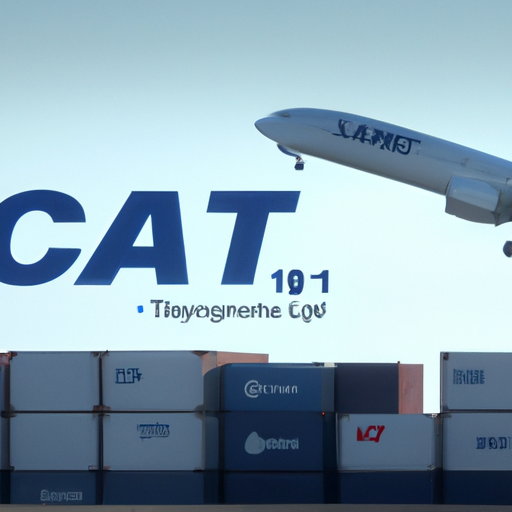
Factors Contributing to the Increase in Global Air Cargo Demand
The International Air Transport Association (IATA) recently announced the first annual increase in global air cargo demand since February 2022. This is exciting news for the aviation industry, which has been heavily impacted by the COVID-19 pandemic. Several factors have contributed to this increase in demand, and understanding them can provide valuable insights into the current state of the global economy.
One of the main factors driving the increase in global air cargo demand is the ongoing recovery of the global economy. As countries around the world continue to reopen and lift restrictions, economic activity is picking up. This has led to an increase in trade and business transactions, which in turn has created a greater need for air cargo services. Companies are looking to replenish their inventories and meet the growing demand for goods, and air cargo provides a fast and efficient way to transport these goods across borders.
Another factor contributing to the increase in air cargo demand is the rise of e-commerce. The pandemic has accelerated the shift towards online shopping, with more people opting to purchase goods from the comfort of their homes. This surge in e-commerce has created a significant demand for air cargo services, as companies need to transport goods from warehouses to customers’ doorsteps quickly and efficiently. Air cargo offers the speed and reliability that e-commerce businesses require to meet customer expectations.
Additionally, the disruption in global supply chains has also played a role in driving up air cargo demand. The pandemic has caused significant disruptions in supply chains, with factories shutting down, transportation networks being disrupted, and borders closing. As a result, companies have had to find alternative ways to transport their goods, and air cargo has emerged as a viable solution. Air cargo allows companies to bypass the bottlenecks and delays associated with other modes of transportation, ensuring that goods reach their destinations in a timely manner.
Furthermore, the increase in demand for medical supplies and vaccines has also contributed to the rise in air cargo demand. The global vaccination efforts have created a need for the rapid transportation of vaccines, syringes, and other medical supplies to different parts of the world. Air cargo has played a crucial role in ensuring the timely delivery of these life-saving supplies, helping countries combat the spread of the virus and protect their populations.
In conclusion, several factors have contributed to the first annual increase in global air cargo demand since February 2022. The ongoing recovery of the global economy, the rise of e-commerce, the disruption in global supply chains, and the increased demand for medical supplies and vaccines have all played a role in driving up air cargo demand. As the world continues to navigate the challenges posed by the pandemic, the aviation industry will play a vital role in facilitating global trade and ensuring the efficient transportation of goods.
Implications of IATA’s Announcement on the Air Cargo Industry

The International Air Transport Association (IATA) recently made an exciting announcement that has brought a glimmer of hope to the air cargo industry. For the first time since February 2022, global air cargo demand has seen an annual increase. This news comes as a breath of fresh air for an industry that has been severely impacted by the ongoing pandemic.
The implications of this announcement are significant for the air cargo industry. It signifies a potential turning point and a step towards recovery. After months of decline and uncertainty, the fact that demand is finally on the rise is a positive sign for airlines and freight forwarders alike.
One of the immediate implications of this increase in demand is the need for increased capacity. As more businesses resume operations and global trade starts to pick up, there will be a greater need for air cargo services. Airlines will have to adapt to this increased demand by adding more flights or utilizing larger aircraft to accommodate the growing volume of cargo.
This increase in demand also presents an opportunity for the air cargo industry to innovate and improve its services. With a surge in demand, there will be a greater focus on efficiency and speed. Airlines and freight forwarders will need to find ways to streamline their operations and reduce turnaround times to meet the growing expectations of their customers.
Furthermore, this increase in demand could also lead to a boost in employment opportunities within the air cargo industry. As airlines and freight forwarders ramp up their operations to meet the growing demand, there will be a need for additional staff, from pilots and ground crew to logistics professionals. This could provide a much-needed lifeline for those who have been affected by job losses in other sectors due to the pandemic.
Another implication of this announcement is the potential for increased collaboration and partnerships within the industry. As demand grows, airlines and freight forwarders may need to work together to ensure smooth operations and efficient delivery of goods. This could lead to the formation of strategic alliances and partnerships that benefit all parties involved.
While this increase in demand is undoubtedly a positive development, it is important to note that the air cargo industry still faces challenges. The ongoing pandemic and its associated restrictions continue to impact global trade and travel. Uncertainty surrounding new variants and potential lockdowns could still disrupt the recovery process.
Additionally, the industry must also address sustainability concerns. As demand increases, so does the carbon footprint of the air cargo industry. It is crucial for airlines and freight forwarders to prioritize sustainability and explore greener alternatives to minimize their environmental impact.
In conclusion, the IATA’s announcement of the first annual increase in global air cargo demand since February 2022 brings hope and optimism to the air cargo industry. The implications of this increase are far-reaching, from increased capacity and employment opportunities to the need for innovation and collaboration. However, challenges still remain, and the industry must continue to adapt and address sustainability concerns. With the right strategies and a collective effort, the air cargo industry can navigate these challenges and pave the way for a brighter future.
Future Outlook for Global Air Cargo Demand
The International Air Transport Association (IATA) recently announced some positive news for the global air cargo industry. After months of decline due to the COVID-19 pandemic, the industry is finally seeing a glimmer of hope. According to the IATA, global air cargo demand has experienced its first annual increase since February 2022.
This news comes as a relief to many in the industry who have been grappling with the challenges posed by the pandemic. The global air cargo industry has been hit hard by travel restrictions and reduced passenger flights, which have severely impacted the capacity for cargo transportation. However, with the gradual easing of restrictions and the rollout of vaccination programs worldwide, there is renewed optimism for the future of air cargo demand.
The IATA’s announcement is a positive sign that the industry is on the path to recovery. It indicates that there is a growing demand for air cargo services as economies reopen and trade resumes. This is particularly encouraging for industries that heavily rely on air cargo, such as e-commerce, pharmaceuticals, and perishable goods.
The future outlook for global air cargo demand looks promising. As countries continue to vaccinate their populations and travel restrictions are lifted, there will likely be an increase in passenger flights. This, in turn, will provide more opportunities for cargo transportation. Additionally, the growth of e-commerce and the increasing demand for online shopping will continue to drive the need for air cargo services.
However, it is important to note that the recovery of the air cargo industry will not happen overnight. There are still challenges to overcome, such as the ongoing impact of the pandemic and the potential for future disruptions. The industry will need to adapt and innovate to meet the changing demands of the market.
One area that will play a crucial role in the future of air cargo demand is sustainability. As the world becomes more conscious of the environmental impact of air travel, there is a growing demand for greener and more sustainable transportation options. The air cargo industry will need to invest in technologies and practices that reduce its carbon footprint and contribute to a more sustainable future.
In conclusion, the IATA’s announcement of the first annual increase in global air cargo demand since February 2022 is a positive development for the industry. It signals a gradual recovery and renewed optimism for the future. As travel restrictions ease and economies reopen, there will likely be an increase in demand for air cargo services. However, the industry will need to navigate challenges and embrace sustainability to ensure long-term success. With the right strategies and innovations, the future of global air cargo demand looks promising.


